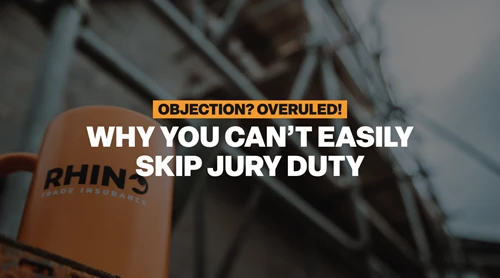In the ever-evolving landscape of trade businesses, one constant factor can disrupt even the most well-established enterprises: rising costs. These cost hikes, whether in raw materials, labour, or operational expenses, can significantly impact the bottom line of your trade business.
In this in-depth guide, we'll dive into the nitty-gritty of what rising costs entail for your trade business and provide actionable insights to help you understand the challenges and navigate them effectively.
Understanding Rising Costs
Rising costs are like ripples in a pond - they start small but can spread far and wide, affecting various aspects of your trade business. Here's a breakdown of the key areas where these effects become evident:
A squeeze on your profit margin
The most immediate impact of rising costs is felt in your profit margins. As the cost of raw materials, labour, and other essentials rises, your ability to maintain healthy profit margins diminishes - this has been felt by trade businesses across the UK, especially over the past couple of years. In fact, it's been reported that early 2023 has seen a record number of business closures across the UK.
The need to be competitive
In an already competitive marketplace, any price increase could drive customers to seek cheaper alternatives - or, god forbid, them trying to do a bit of DIY themselves! Striking the right balance between adjusting your prices to cover costs while maintaining your competitive edge becomes a delicate art.
Cash Flow
An abrupt surge in costs can strain your cash flow, making it challenging to meet crucial financial obligations like paying your employees, suppliers, and creditors. This underscores the importance of maintaining a robust financial buffer.
Putting Growth on Hold
The ripple effect of rising costs can also impact your plans and investment initiatives. The increased expenses might force you to reconsider investing in new technologies, employing more staff or opening up new avenues for growth.
Nurturing Customer Relationships
Open communication with your customers becomes paramount if cost increases lead to price hikes. Transparently explaining the rationale behind price adjustments can help maintain the trust and loyalty you've created in your local area.
Employee Morale
When faced with budget constraints due to rising costs, you might be tempted to cut corners or scale back on employee benefits. However, such actions can negatively impact employee morale and motivation, ultimately affecting your business's overall performance.
What are the factors causing rising costs?
To effectively tackle rising costs, it's crucial to understand their underlying triggers in the trade industry. Several factors can contribute to these upward cost pressures:
Supply Chain Turmoil
Global events like the pandemic, geopolitical tensions, and natural disasters can disrupt supply chains, causing material shortages and consequently escalating costs. Sometimes we lose sight of how interconnected our world is, so timber from Canada or tools from China can be exposed to supply chain issues.
Inflation
Inflation, the general increase in prices across the economy, can lead to rising costs for labour, goods, and services. Economic conditions and fiscal policies play a pivotal role in driving inflation rates. As we have seen in the UK, the policy has been to control inflation through interest rises - whether this works is still to be seen.
Workplace costs
Variations in labour markets, changes in minimum wage, and shortages of skilled labour can all lead to heightened costs to your business, placing additional pressure on your bottom line.
Energy Price Volatility
Energy costs, encompassing electricity and fuel expenses, directly influence various aspects of trade business operations, from transportation to manufacturing processes - especially when the prices are changing daily.
Regulatory Roadblocks
Changes in UK law and regulations, be it environmental standards or safety requirements, might demand investments in new equipment, modified processes or extra training, thereby increasing costs. We see this a lot across the trade sector due to the ever-increasing need to be safer.
How to navigate rising costs in your trade business?
While grappling with rising costs might seem daunting, it's far from impossible. Here are some actionable strategies to help you chart your course through these turbulent waters:
Thorough cost analysis
Begin by conducting a comprehensive evaluation of your business expenses. Identifying which areas have witnessed the most significant cost hikes will help you prioritise where to focus your efforts.
Get efficient
Seek every possible opportunity to streamline your trade business and eliminate waste. Whether this is embracing technological advances to help you better manage your clients, invoices, marketing or budgets or whether it's by outsourcing certain roles in your company.
Forge Strong Supplier Relationships
Establishing solid relationships with your suppliers can be a game-changer. Negotiating bulk discounts, exploring alternative suppliers, or even forging strategic partnerships can translate to better deals on materials and supplies.
This leads us nicely to diversifying your supplier base to mitigate the risk of supply chain disruptions. Exploring local sourcing options could also help counteract cost hikes resulting from international events.
Value-Driven Pricing
When speaking to potential customers, emphasise the unique value and expertise your trade business offers instead of purely competing on price. This approach can help justify higher prices to your customers, provided you effectively communicate the benefits.
Invest in Employee Growth
Prioritise investing in training and development for your workforce. Skilled employees are more efficient and can contribute innovative solutions that reduce costs. We wrote all about the reason to have a fully trained team in our blog post here.
Robust Financial Planning
Build a robust financial plan that includes provisions for unforeseen cost increases. Having a safety net in place for your trade can offer a cushion during challenging times.
Always stay ahead of the curve and be prepared.
Your ability to adapt and communicate effectively becomes your greatest asset in an industry that's constantly evolving. Here's how they play a pivotal role:
Transparent Communication
Open and transparent communication with your trade customers is paramount if the need arises to adjust prices due to rising costs. Helping them comprehend the reasons behind these changes can maintain customer loyalty. Learn how to price your trade work here.
Be flexible
Be prepared to adapt your business as market conditions change. Flexibility equips you to pivot swiftly, minimising the impact of rising costs on your operations.
Keep vigilant
Keep a watchful eye on your expenses and stay informed about market trends. Proactively identifying cost increases can give you a competitive edge and help you produce effective responses to an incoming shock.
Invest in quality trade insurance today.
Rising costs are a reality that every trade business must face at some point. However, armed with the right knowledge, strategy, and a willingness to adapt, you can navigate these challenges and continue to thrive. By understanding the underlying factors, implementing cost-effective strategies, and prioritising transparent communication, your trade business can weather the storms of rising costs and emerge stronger on the other side. Remember, challenges are opportunities in disguise - seize them!
Rhino Trade Insurance has developed a variety of customised insurance policies for tradespeople running businesses of all sizes and types. Our insurance can help defend your company when a legal claim comes knocking in various situations, including accidents, legal fees, tool theft, professional negligence, and more.
Call our friendly, experienced team today, who will quickly assist you in setting up whatever cover you require on 0116 243 7904. For more info and a quote in less than 60 seconds, visit this link to get started with our straightforward online quote engine.




